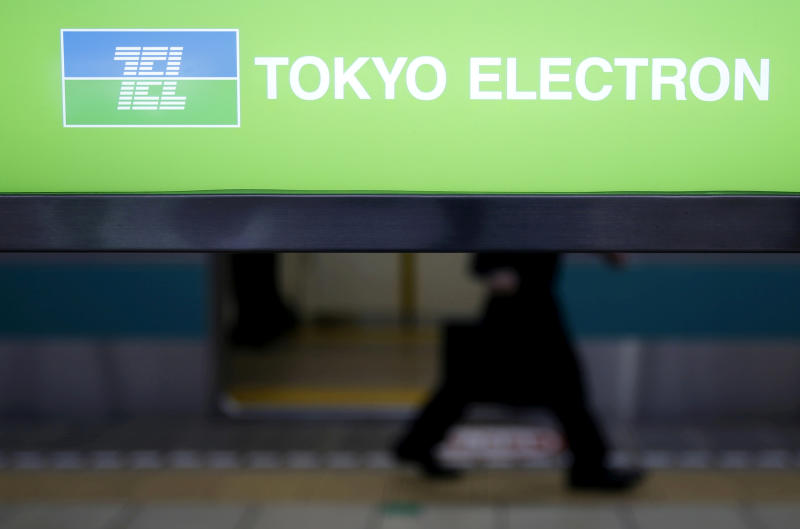Top Japanese chip gear firm Tokyo Electron to honour US blacklist of Chinese firms
Sign up now: Get insights on Asia's fast-moving developments

Tokyo Electron controls nearly 90 per cent of the market for microchip coaters and developers.
PHOTO: REUTERS
Follow topic:
TOKYO (REUTERS) - Japan's Tokyo Electron, the world's No.3 supplier of semiconductor manufacturing equipment, will not supply to Chinese clients blacklisted by Washington, a senior company executive told Reuters.
The decision shows how Washington's effort to bar sales of technology to Chinese companies, including Huawei Technologies, is ensnaring non-American firms that are not obliged to follow US law.
China, which is locked in a crippling trade war with the United States, is pushing to build its semiconductor industry to reduce its reliance on US, Japanese and European suppliers for chip-making machinery.
"We would not do businesses with Chinese clients with whom Applied Materials and Lam Research are barred from doing businesses," the executive said, referring to the top US chip equipment firms.
"It's crucial for us that the US government and industry see us as a fair company," he said, citing Tokyo Electron's long US partnership since the 1960s, when it started off as an importer of US equipment.
He did not want to be named given the sensitivity of the matter. Applied Materials and Lam Research declined to comment.
Another major Japanese chip equipment supplier is also considering halting shipments to blacklisted Chinese firms, a person familiar with the matter said.
"The issue is beyond something we can decide on our own,"said the person, who also declined to be identified.
Executives at other equipment suppliers said they were communicating closely with the Japanese industry ministry.
"We haven't received any specific instructions from the ministry," one of the executives said. "We are aware that we could be in deep trouble if we take advantage of the US export ban to expand businesses with China."
The Tokyo Electron executive did not specify the names of the Chinese clients, but state-backed memory chipmaker Fujian Jinhua Integrated Circuit is currently on a list of entities that cannot buy technology goods from US firms.
Fujian Jinhua did not respond to an e-mailed request for comment. A handful of other Chinese companies and research institutions are on a "red list" that US companies have been advised to avoid.
Huawei's chip arm, HiSilicon, is a so-called fabless company focusing on chip design and thus is not normally a buyer of chip-manufacturing gear. But Huawei also faces major risks from non-US suppliers adhering to the US blacklist.
British chip designer ARM, owned by Japan's SoftBank , has halted relations with Huawei, potentially crippling the Chinese company's ability to make new chips for its future smartphones.
But Taiwan Semiconductor Manufacturing, global leader in chip production and maker of many Huawei chips, has said it would continue to be a supplier to Huawei.
US law specifies that any product comprising 25 per cent or more US content is subject to the US export control restrictions.
But the Japanese chip equipment executives did not cite that as a reason for cutting off supplies to some Chinese companies.
"It's not impossible for Japanese companies like Tokyo Electron to replace their US rivals and complete production lines for China," an executive at a US chipmaker said. "But in reality, that's very difficult considering a US backlash."
The highly specialised chip equipment industry is relatively small, but the gear is strategically critical for all semiconductor manufacturers.
Making chips involves numerous processes that require different types of equipment. Each market segment is typically dominated by just a few players.
Tokyo Electron controls nearly 90 per cent of the market for microchip coaters and developers. It competes directly with Applied Materials and Lam Research in some segments.
Beijing has been investing heavily to grow domestic chip equipment suppliers as part of an effort to achieve its goal of producing 70 per cent of the semiconductors it uses by 2025.
But industry sources say technologies at those suppliers are still far behind, leaving China dependent on imported equipment.
Today, only 16 per cent of the semiconductors used in China are produced in-country, half of which are made by Chinese firms, according to the Centre for Strategic and International Studies, a Washington-based think-tank.
But aggressive investments by local chipmakers and foreign players such as Samsung Electronics made China the world's No. 2 market for chip equipment last year.
Many chip equipment manufacturers are forecasting substantial profit drops this year as the China-US trade war dampens demand for chips and chip equipment globally.

